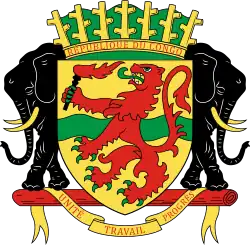| ||||||||||||||||||||||
| Results | ||||||||||||||||||||||
|---|---|---|---|---|---|---|---|---|---|---|---|---|---|---|---|---|---|---|---|---|---|---|
| ||||||||||||||||||||||
| Source: African Elections Database | ||||||||||||||||||||||
 |
|---|
|
|
A constitutional referendum was held in the Republic of the Congo on 20 January 2002, with results showed over 87% voted in favour with a voter turnout of 77.5%.
Background
The proposed new constitution would make the country a presidential republic. It had been written in 2001 and approved by a National Transitional Council in 2002 before being put to a referendum.[1] Changes from the old constitution increased presidential terms to seven years and abolished the post of Prime Minister.[2] It established a bicameral legislature and instituted several requirements in order to be able to stand for President.[3]
The government described the referendum as paving the way for elections and welcomed the results.[4] However the opposition urged that voters boycott the referendum as they said that the new constitution would give too much power to the President.[4] Human rights groups said that the referendum, which took place without international observers, had seen irregularities.[4]
Results
| Choice | Votes | % |
|---|---|---|
| For | 1,113,955 | 87.83 |
| Against | 154,375 | 12.17 |
| Invalid/blank votes | 49,908 | - |
| Total | 1,318,238 | 100 |
| Source: African Elections Database | ||
References
- ↑ "Background Note: Republic of the Congo". United States Department of State. Retrieved 2009-07-13.
- ↑ "African Elections Database". African Elections Database. Retrieved 2009-07-13.
- ↑ "Election Profile". IFES Election Guide. Retrieved 2009-07-13.
- 1 2 3 "Congo approves new constitution". BBC News Online. 2002-01-24. Retrieved 2009-07-13.